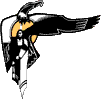

|
|
American Indian / Indigenous Education | |
| books | conferences | articles | columns | contact | links | index | home | |
American Indian & Indigenous Education BooksAvailable from the publishers and Amazon.com & Barnes & Noble |
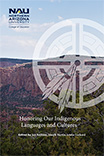 |
edited by Jon Reyhner, Joseph Martin, & Louise Lockard Honoring Our Indigenous Languages and Cultures is the sixth monograph published by Northern Arizona University's College of Education in conjunction with its American Indian/Indigenous Teacher Education Conferences (AIITECs). It includes chapters on Indigenous language revitalization, teaching Indigenous languages, and Mexican intercultural universities. 2024. 129 pp. + viii. |
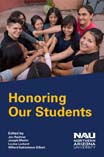 |
edited by Jon Reyhner, Joseph Martin, Louise Lockard & Willard Sakiestewa Gilbert Honoring Our Students is the fifth monograph published by Northern Arizona University's College of Education in conjunction with its American Indian/Indigenous Teacher Education Conferences (AIITECs) focusing on better preparing teachers of Indigenous students. Included are chapters on Indigenous ways of knowing, family literacy, Navajo language revitalization, tribal sovereignty, tribal identity, self determination, and teacher recruitment. Dr. Timothy Begaye, in the Summer 2022 issue of Tribal College, notes that Honoring Our Students "offers recent research and first-hand accounts on improving learning environs for Indigenous children and provides a look at the fluctuating policies that shape Indian education." 2020. 166 pp. + x. |
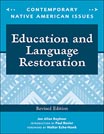 |
Jon Reyhner Education and Language Restoration briefly traces the history of education from Indian boarding schools to the present day and includes information on language revitalization. It has chapters on assimilation and the Native American, community-controlled schools and tribal colleges, Native American identity, language and culture revitalization, language policies and education goals, language teaching, language and reading, and teaching and learning styles. It has black and white photographs, sidebars, chronology, bibliography, further reading, web sites, and source notes. Infobase, 2019. ISBN-13: 978-1-4381-9404-2, EBOOK. |
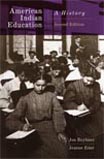 | Jon Reyhner & Jeanne Eder A comprehensive history from colonial times to the present that draws on firsthand accounts from teachers and students to explore the broad spectrum of Native experiences in missionary, government, and tribal boarding and day schools; to reveal the effects of changes in government policies and educational philosophies; and to explore the current resurgence of American Indian nations. Michael C. Coleman wrote in Western Historical Quarterly about the 1st editon, "I strongly recommend this book.... general readers will benefit from the deep historical perspective on the educational problems and opportunities facing today's Native Americans. Scholars will also appreciate the broad, yet richly-detailed, account presented," and Michael W. Simpson wrote in Tribal College, "history should be readable. This book is an easy read with a story that flows, but is not simplistic" and that it "should be part of the library and instruction at all tribal colleges." 2017. 392 pp. + xv. ISBN 9780806157764. University of Oklahoma Press |
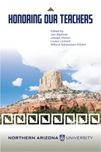 |
edited by Jon Reyhner, Joseph Martin, Louise Lockard & Willard Sakiestewa Gilbert Honoring Our Teachers is the fourth monograph published by Northern Arizona University's College of Education in conjunction with its American Indian/Indigenous Teacher Education Conferences (AIITEC) focusing on better preparing teachers of Indigenous students. Together, the contributors to this volume make a strong case for the importance of providing Indigenous students with a culturally appropriate education that builds on their cultural and experiential backgrounds. The contributors explore how important it is for teachers to learn about the homes and communities that their students come from and return to as well being subject matter experts and developing their instructional expertise. In addition, teachers need to recognize the importance of their remaining lifelong learners through continued professional development. In return, we all need to honor teachers for their dedicated efforts to educate our children and thus empower them as family members and tribal and global citizens. 2017. 214 pp. + viii. ISBN 978-0-9670554-8-0 |
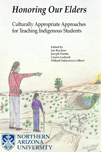 |
edited by Jon Reyhner, Joseph Martin, Louise Lockard & Willard Sakiestewa Gilbert Honoring Our Elders is dedicated to the memory of Blackfoot educator Darrrell R. Kipp. Dr. Sharon S. Nelson-Barber, Senior Program Director for Culture & Language in Education at WestEd writes that it is "essential reading for anyone interested in Indigenous education and endangered language preservation and revitalization. Personal testimonies and rich descriptive examples illuminate topics such as the use of heritage language as an essential bridge to identity development, confidence, and self-efficacy; collaborative, action research as a means to enhance instructional practice; the multidisciplinary nature of authentic indigenous pedagogy; and the challenges of implementing dialect sensitive revitalization. The discussion of how the teaching of endangered language differs from non-endangered languages such as English will stimulate lively discussion. Each chapter is compelling and some are provocative. Collectively they represent a powerful ideology." Northern Arizona University, 2015. 212 pp. + vi. ISBN 978-0-9670554-7-3 |
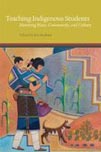 |
edited by Jon Reyhner This volume puts culturally based education squarely into practice. It brings together new and dynamic research from established and emerging voices in the field of American Indian and Indigenous education. All of the contributions show how the quality of education for Indigenous students can be improved through the promotion of culturally and linguistically appropriate schooling. Grounded in place, community, and culture, the approaches set out in this volume reflect the firsthand experiences of teachers and students in interacting not just with texts and one another, but also with the local community and environment. The authors address the specifics of teaching the full range of subjects--from learning literacy using culturally meaningful texts to inquiry-based science curricula, and from math instruction that incorporates real-world experience to social studies that blend oral history and local culture with national and world history. University of Oklahoma Press, 2015. Paperback ISBN: 9780806146997 223 Pages, 6" X 9" Table of Contents |
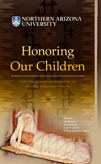 |
edited by Jon Reyhner, Joseph Martin, Louise Lockard & Willard Sakiestewa Gilbert Dedicated to the memory of Dr. Angayuqaq Oscar Kawagley, Honoring Our Children provides a rationale for and examples of culture-based education to support strong positive identities and academic success for Indigenous and other children. Examples from Canada, India, and across the United States give support to adapting curriculum and instruction to the cultural backgrounds of students. In his 2014 review of this book, Dr. Jean-Paul Restoule (University of Toronto) in AlterNative wrote, "This book is critical reading for students and scholars of indigenous education, particularly those who are policymakers, curriculum leads, or new or experienced teachers and principals. Informed as it is by many years of practice and research, this volume will give anyone involved in advancing indigenous education inspiration to continue and ideas to ruminate on and digest before returning to the field to make real change." Northern Arizona University, 2013. 156 pp. + x. ISBN 978-0-9670554-6-6 |
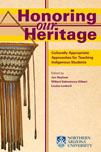 |
edited by Jon Reyhner, Willard Sakiestewa Gilbert, & Louise Lockard Dedicated to the memory of Dr. William G. Demmert, Jr., Honoring Our Heritage can assist educators and policy makers understand how the education of Indigenous children can be improved through building on their cultural heritage and involving their families and local communities. The first two chapters give an overview of culture-based education. Then examples are presented of how Indigenous students and teachers can be "turned on" to education and appreciate Indigenous knowledge through science, art and history. The last two chapters describe examples of community Indigenous educational involvement. Northern Arizona University, 2011. 198 pp. + xii. ISBN 978-0-9670554-5-9 |
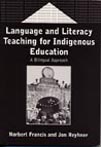
|
Norbert Francis & Jon Reyhner Presents a proposal for the inclusion of indigenous languages in the classroom. Based on extensive research and field work by the authors in communities in the United States and Mexico, the book explores ways in which the cultural and linguistic resources of indigenous communities can enrich the language and literacy program. "Overall, the book is well written, it's interesting and is pleasant to read. The book achieves to present the writers aim and central idea very well: there is a lot of knowledge on second language learning that should be used in teaching indigenous children and that the indigenous cultures have a lot of material in non-traditional form that could and should be used in education."--Karita Laisi, University of Helsinki. LINGUIST List 4/1/03. Multilingual Matters, 2002. 275 pp. + ix. ISBN 1-85359-600-0 |
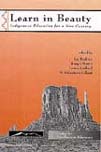
| edited by Jon Reyhner, Joseph Martin, Louise Lockard, & W. Sakiestewa Gilbert The title Learn in Beauty is adapted from a traditional Navajo prayer that calls for listeners to "walk in beauty" and live in harmony with their world. The 11 papers collected here indicate some of the new directions that indigenous education is taking at the beginning of the 21st century. Since the 1970s the U.S. Government has had an official policy of self-determination for American Indians and Alaska Natives. The efforts by various Native groups to chart their own destinies have resulted in both successes and failures, and education is just one aspect of their efforts. It is hoped that the discussion of indigenous education in this volume contributes to the progress of indigenous education. Northern Arizona University, 2000. 152 pp. + viii. ISBN 0-9670554-1-5. |

| edited by Jon Reyhner A comprehensive resource for educators that maintains that Indian students can improve academic performance through educational approaches that don't force them to choose between their home culture and the school's. It summarizes research on Indian education, provides practical suggestions for teachers, and offers a vast selection of resources and includes chapters on bilingual and multicultural education; the history of U.S. Indian education; teacher-parent relationships; language and literacy development, with particular discussion of ESL and American Indian literature; and teaching in the content areas of social studies, science, math, and PE. "Well-integrated chapters are organized around five main topics.... With substantial appendixes on Indian education statistics, literature and teaching resources, a comprehensive list of references, and a useful index, this new edition is an essential handbook for teaching American Indian students."--Choice. Described as "a must read!" in Tribal College, Fall 1998. Contains information on the historical suppression of American Indian languages in schools and modern efforts at using American Indian languages in bilingual education programs. Foreword by former U.S. Senator Ben Nighthorse Campbell. University of Okahoma Press, 1992. 328 pp. + xiii. ISBN 0-8061-2674-4. |
| books | conferences | articles | columns | contact | links | index | home | |
| Copyright © 2022 Northern Arizona University, All rights reserved. |